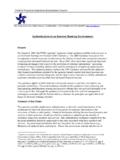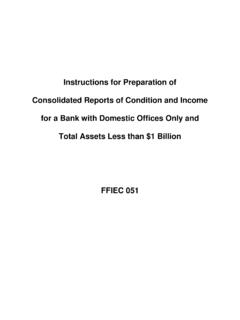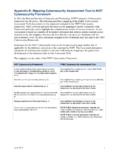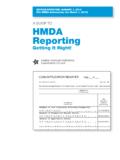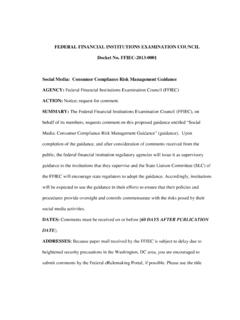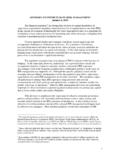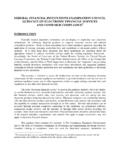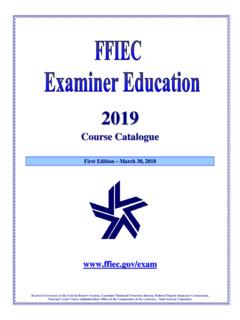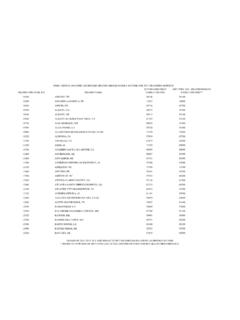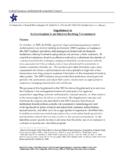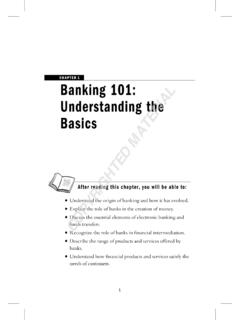Transcription of INDEPENDENT AUTOMATED TELLER MACHINE OWNERS OR …
1 INDEPENDENT AUTOMATED TELLER MACHINE OWNERS or Operators FFIEC BSA/AML Examination Manual 1 November 2021 INDEPENDENT AUTOMATED TELLER MACHINE OWNERS OR OPERATORS Objective: Evaluate the bank s policies, procedures, and processes to assess, manage, and mitigate potential risks associated with customers who are INDEPENDENT AUTOMATED TELLER MACHINE (ATM) OWNERS or operators, including INDEPENDENT Sales Organizations (ISOs). Evaluate the bank s compliance with regulatory requirements, such as customer identification, customer due diligence (CDD), beneficial ownership of legal entity customers, currency transaction reporting, and suspicious activity reporting with respect to these customers.
2 Examiners are reminded that there are no Bank Secrecy Act (BSA) regulations specific to customers who are INDEPENDENT ATM OWNERS or operators, including ISOs. AUTOMATED TELLER Machines (ATMs) offer fast and convenient access to cash and are an important channel in providing financial services, including in underserved markets. INDEPENDENT ATMs1 are ATMs not owned by banks. An INDEPENDENT ATM operator is a person or an entity that is in the business of owning, leasing, managing, or otherwise controlling access to the interior of an ATM, including its internal cash vault. The INDEPENDENT ATM operator may be the same or different from the INDEPENDENT ATM owner.
3 INDEPENDENT ATMs may be found in a wide variety of public and retail venues. There are various business models that may apply to bank customers who own or operate INDEPENDENT ATMs. For some bank customers, INDEPENDENT ATM ownership or operation is their core business. For others, it is an ancillary service offered as a convenience to their customers. A retail business, for example, may purchase or lease an INDEPENDENT ATM to better serve its cash customers, attract new customers to its business, or add revenue to its primary retail business through service fees charged to customers who use the INDEPENDENT ATM. Where INDEPENDENT ATM ownership or operation is the customer s core business, a company may own and deploy multiple ATMs that service thousands of consumers.
4 Many operators of these INDEPENDENT ATMs are also considered INDEPENDENT Sales Organizations (ISOs). An ISO is generally a person or entity that is (1) approved by, and under contract with, a sponsor bank2 to deploy and service INDEPENDENT ATMs and (2) under contract with an approved acquiring processor to route INDEPENDENT ATM transactions to Electronic Funds Transfer (EFT) networks for which the ISO has been registered by the sponsor bank. 1 This section focuses on INDEPENDENT ATMs that offer remote access to customer accounts for the purpose of making balance inquiries or cash withdrawals. The agencies recognize that financial services kiosks that allow individuals to facilitate payments or other types of transactions, or to purchase or sell convertible virtual currencies, are sometimes referred to as ATMs.
5 These latter entities may be engaged in money transmission consistent with FinCEN guidance. See FinCEN (May 9, 2019), FIN-2019-G001, Application of FinCEN s Regulation to Certain Business Models Involving Convertible Virtual Currencies. These ATMs may present additional or different risks, and the agencies may provide additional guidance to examiners in this area. 2 A sponsor bank is a financial institution that is a member of one or more electronic funds transfer networks having a program to allow registration of ISOs for authorized access by ATMs to such networks. INDEPENDENT AUTOMATED TELLER MACHINE OWNERS or Operators FFIEC BSA/AML Examination Manual 2 November 2021 EFT networks include national ( , Visa s PLUS and MasterCard s CIRRUS) and regional networks ( , NYCE and STAR).
6 ISOs are contractually subject to the EFT network s rules, and if the ISO also provides network access to other INDEPENDENT ATM OWNERS or operators, it also has a responsibility to ensure that these INDEPENDENT ATM OWNERS or operators comply with the EFT network s requirements. In practice, agreements between the INDEPENDENT ATM owner or operator and the ISO reflect the establishment of all management and operating policies relating to the ISO s acquiring pr ocessor and for the INDEPENDENT ATM owner or operator in complying with the standards of the EFT network. For all types of INDEPENDENT ATMs, OWNERS or operators generally need bank accounts to supply cash for the ATMs and to settle the electronic funds transfers used to process the ATM transactions.
7 The owner or operator may elect to replenish cash in the ATM and conduct other basic maintenance, or the ISO may complete these functions. Examiners are reminded that no specific customer type automatically presents a higher risk of money laundering, terrorist financing (ML/TF), or other illicit financial activity. Further, banks that operate in compliance with applicable Bank Secrecy Act/anti-money laundering (BSA/AML) regulatory requirements and reasonably manage and mitigate risks related to the unique characteristics of customer relationships are neither prohibited nor discouraged from providing banking services to INDEPENDENT ATM owner or operator customers, including those that are ISOs.
8 Risk Factors INDEPENDENT ATM owner or operator customers present varying levels of ML/TF and other illicit financial activity risks, and the potential risk to a bank depends on the presence or absence of numerous factors. Not all INDEPENDENT ATM owner or operator customers pose the same risk, and not all INDEPENDENT ATM owner or operator customers are automatically higher risk. The potential risk to a bank depends on the facts and circumstances specific to the customer relationship, such as transaction volume, locations of the ATMs, and the source of funds to replenish the ATMs. Because of the cash-intensive nature of an ATM, the source of funds used to replenish the ATM is a key risk factor.
9 INDEPENDENT ATM OWNERS or operators that fund their ATM replenishment solely with cash withdrawn from their account at a bank pose a relatively lower ML/TF risk because the bank knows the source of funds and can compare the volume of cash usage to EFT settlements to identify suspicious activity. Conversely, INDEPENDENT ATM OWNERS or operators that replenish ATMs from other or unknown cash sources may present potentially higher ML/TF risks, as the source of cash can be difficult for the bank to verify. ML/TF and other illicit financial activity may occur through INDEPENDENT ATMs when an ATM is replenished with illicit currency that is subsequently withdrawn by ATM users.
10 Commingling cash from both illicit and legitimate sources in the ATM can make all transactions in the INDEPENDENT ATM owner s or operator s account appear to be legitimate. The INDEPENDENT ATM owner or operator would receive clean funds back via the ATM settlement process in the form of ACH deposits that appear to be from INDEPENDENT AUTOMATED TELLER MACHINE OWNERS or Operators FFIEC BSA/AML Examination Manual 3 November 2021 legitimate sources but are actually part of an ML/TF or other illicit financial activity scheme. Many states do not currently register, monitor the activity of, or examine INDEPENDENT ATM OWNERS or operators. In addition, INDEPENDENT ATM OWNERS or operators are not generally considered money services businesses and are, therefore, not required to have AML compliance programs.
